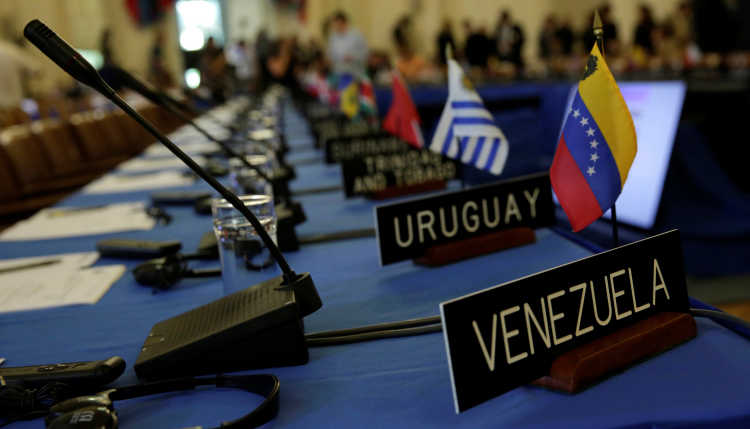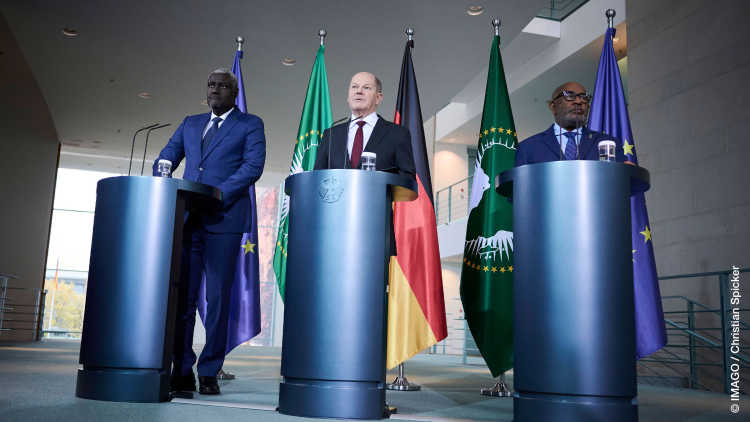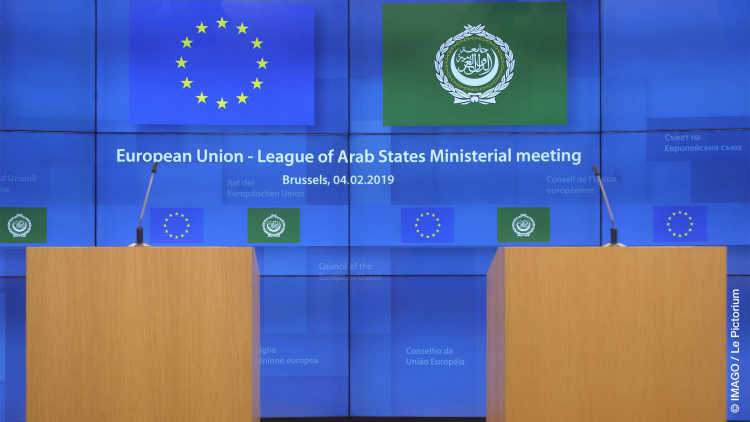- Home
- Publications
- GIGA Focus
- “Organization of African Unity”: An Optimist’s Appraisal 60 Years On
GIGA Focus Africa
“Organization of African Unity”: An Optimist’s Appraisal 60 Years On
Number 3 | 2023 | ISSN: 1862-3603

The Organization of African Unity, recognised for its promotion of solidarity and sovereignty across Africa, just turned 60. Today, the African Union continues the OAU’s spirit and mission. Sixty years of pan-African cooperation have been defined by tremendous challenges and underappreciated achievements – but, above all, they have demonstrated a continued appreciation for multilateralism.
Colonial legacies meant that nascent African states with often arbitrarily drawn borders and limited territorial control had the difficult task of achieving full decolonisation, ensuring inter-state peace, and integrating into the international system. Despite being dealt a bad hand, the early OAU played a crucial role in the strides made by the African community towards achieving these ends.
Over time, the need for African solutions and African agency in dealing with new developments and challenges has become undeniable. Efforts to make the OAU fit for purpose ultimately led to the establishment of the more authoritative and sophisticated AU at the turn of the new millennium. This concluded a remarkable institutional transformation and ushered in a new era of cooperation.
Today’s AU is a natural ally for promoting norms and goals shared by the European Union and others, including democracy and good governance, human rights, economic development, peace and security, and environmental protection. With its inclusive membership and history of representation, a strong AU can play an important role in achieving progress and serve as Africa’s voice on the world stage.
Policy Implications
The African–European partnership is crucial for dealing with many issues of mutual concern, but should not be taken for granted. For the partnership to be sustainable and effective in the long run, it is important for policymakers in Europe to recognise their own hand in the challenges Africa faces, and to respect African agency, support African-led solutions, and to accept cooperation as equals.
Introduction
On 25 May 2023, the Organization of African Unity celebrates its 60thanniversary. By now, the torch is being carried by the African Union, but the OAU’s spirit continues to reverberate and be upheld in the AU’s mission. When it comes to cooperation between African states, critical and even cynical voices often take over the discourse. While their validity is not to be denied, ensuring that the often-underappreciated positives and opportunities are also highlighted is key – even as many challenges and concerns remain. We cannot understand and assess today’s African cooperation without considering how the past 60 years have shaped it. This includes its normative foundations, the specific and challenging context it occurs within, as well as its significant evolution over time. Understanding the history and contextualising the present is crucial for constructive engagement in Africa and with African actors. This is particularly true for European (note, not just European Union) decision-makers, who have witnessed regional integration at home evolve under markedly different circumstances and thus may improperly project their own experiences and expectations onto Africa. To these ends we must recount the history of the OAU, look at where this has left us today, and talk about what this all means for the African–European partnership.
A Dawning Mission: The OAU and Its Contributions to Statehood across Africa
The OAU was founded in 1963, occurring against the backdrop of decolonisation in Africa. With 33 member states at the time of its inauguration, the OAU started out considerably smaller than it would eventually become – having some 53 member states by the time the AU replaced it. The OAU constituted an effort to unite existing and emergent African states in solidarity. A compromise between different groups of states paved the way for the OAU as we came to know it. While the language of “pan-Africanism” was adopted to satisfy the expectations of those states striving for deeper integration and an eventually politically united Africa supranational in nature, the voices that advocated for a framework in which each state retains full national sovereignty ultimately proved stronger and won out. Consequently, the OAU Charter emphasised respect for the sovereignty and territorial integrity of member states, and the principle of non-interference in internal affairs.
The promotion of African states in the Westphalian sense, the support for independence movements, and the fight against Apartheid came to define the OAU’s primary utility and success. The OAU’s border doctrine (cf. Touval 1967), which enshrined respect for state borders at the time of independence, is particularly noteworthy and underappreciated. As the ongoing Russian aggression against Ukraine demonstrates, the respect for borders and the commitment to not unilaterally altering them by force – even decades after independence – cannot be taken for granted. African states, suffering from often arbitrarily drawn borders that failed to respect the realities of established communities on the ground, were particularly vulnerable to inter-state conflict. Yet despite the many problems caused by European colonisation, ones that continue to reverberateto this day, open war between states has remained surprisingly rare across Africa (though certain internal conflicts have had their international dimensions for sure). The instantly famous statement by the Kenyan ambassador to the United Nations, Martin Kimani, in response to the Russian invasion of Ukraine specifically invoked this important African legacy:
Kenya and almost every African country was birthed by the ending of empire. Our borders were not of our own drawing. They were drawn in the distant colonial metropoles of London, Paris and Lisbon, with no regard for the ancient nations that they cleaved apart. […] At independence, had we chosen to pursue States on the basis of ethnic, racial or religious homogeneity, we would still be waging bloody wars these many decades later. Instead, we agreed that we would settle for the borders that we inherited, but we would still pursue continental, political, economic and legal integration. (United Nations Security Council 2022: 8)
The OAU’s role in creating – against all odds – a system of political cooperation that at its core is built on anti-colonialism and independence, respect for national sovereignty and territorial integrity, and on peaceful relations between states deserves recognition as the organisation’s pre-eminent contribution.
A Period of Change: Responding to New Challenges in and for Africa in the 1990s
In the 1990s, the international environment would change dramatically. The repercussions from the end of the Cold War, which had dominated international geopolitics for decades, were felt across the globe, affecting African cooperation too. The continent’s strategic importance waned with the demise of the bipolar world order, and the broader international community’s interest in African affairs turned modest. Violent conflict shook Africa in this watershed decade, with crises such as state failure in Somalia and the genocide in Rwanda alarming observers. It became clear that “African solutions to African problems,” a mantra first coined in 1994 by political economist George Ayittey in response to the crisis in Somalia (Ayittey 1994) and later formally embraced by the AU (cf. African Union 2013), were indispensable for effectively and sustainably solving the issues plaguing the continent.
A number of security concerns would rise to the fore at the same time as unease about extreme poverty mounted, globalisation was becoming an increasingly undeniable force, and a notable – albeit uneven – wave of democratisation started to sweep through Africa. In the wake of these developments, it became apparent that the OAU was no longer fit for purpose. Its mandate and institutional setup reflected a different era, its reputation among observers as a “trade union of tyrants” (van Walraven 2010: 47) preceded it, and reform became imperative. Efforts at the latter initially led to gradual change but eventually culminated in wholesale reform with the agreement to establish the AU in 1999.
A New Beginning: Institutional Transformation and the Birth of the AU
In 2002, the AU officially succeeded the OAU. This new institution’s establishment undoubtedly marked a milestone in African cooperation. Its founding was used to proclaim new beginnings: early on, the AU soon became a symbol of hope and ambition. The AU was meant to ensure African agency and thus provide African solutions to African problems. Among other changes, a new “era of non-indifference” was hailed, intended to supplant the erstwhile overly dogmatic adherence to non-interference norms within Africa (Mwanasali 2008).
More than anything else, this was exemplified by Article 4(h) of the Constitutive Act of the AU, which conveys
the right of the Union to intervene in a Member State […] in respect of grave circumstances, namely: war crimes, genocide and crimes against humanity. (African Union 2000)
The AU’s founding document retains the spirit of the OAU Charter but commits anew – or at least more explicitly – to a broad range of purposes, including political and economic integration, international influence, peace and stability, democracy and good governance, human rights, and healthcare. The pursuit of these ends was substantiated and strengthened through such legal agreements as: the “Protocol Relating to the Establishment of the Peace and Security Council of the African Union” (also the foundation for the sophisticated “African Peace and Security Architecture” we know today); the “African Charter on Democracy, Elections and Governance”; the “New Partnership for Africa’s Development”; and, the “Sirte Declaration on the Reform of the United Nations.”
To deliver on its new normative framework, stronger institutions were created. The increases in pooled sovereignty and delegated authority (cf. Hooghe et al. 2017) are a testament to the desire to advance cooperation at the continent-wide level and to enhance its effectiveness. As a result of the transformation occurring, the institutional framework was now strong, flexible, and sophisticated enough to – at least in theory – put the AU in the position to deliver on the promise of African solutions to African problems and thus also of African agency.
A Reality Check: Understanding Today’s Dilemmas and Dynamics of African Cooperation
In 2023, as the 60th anniversary of the OAU’s founding is celebrated, evaluations of how successful formal African cooperation has been are ambivalent. Clearly, sceptical and even cynical views remain prominent. Part of the reason for this is a matter of perspective. Respective stakeholders and observers will have different priorities and expectations according to which they evaluate organisational performance. Often, evaluators will apply their own normative criteria or use their own strategic priorities as reference points, and insufficiently consider the expectations of the AU’s own core stakeholders: its member states. This can result in unrealistic expectations and, consequently, frustration. Producing benefits for the broader public and solving transnational problems effectively is only one part of the equation, already something that cannot be taken for granted in the world of regional organisations.
Another part of the equation, however, is serving member-state governments and executing the collective mandate in ways that are acceptable to them. When both parts of this fundamental equation converge, African cooperation arguably holds its greatest promise (see Krösche 2023: 53). The AU can deliver on its mandate when member states seek or accept its support, but its limitations become readily apparent when they do not. This is by no means unique to Africa, but it may be particularly frustrating in this context due to the combination of noble ambitions, widespread challenges, and members wary of outside interference. Worrisome signs of “democratic backsliding” (Campbell and Quinn 2021), denoting the erosion of democratic institutions and processes, only add to these concerns over what African cooperation can and will deliver. Regionalism for authoritarian and/or weak regimes often serves a means to advance their narrow personal interests rather than those of the broader public or of the community of states (Libman and Obydenkova 2018; Taylor and Söderbaum 2016). Moreover, the complex overlap of intergovernmental organisations operating in Africa – from Regional Economic Communities to the global-level UN – as well as persistent resource limitations – historically creating reliance on funding from external partners, especially from Europe – continue to raise the question of what exact role the AU normatively should and indeed can play.
A Look into the Future: The AU’s Promise, and Why Europeans Should Care
This all begs the question: quo vadis, AU? Despite the many legitimate concerns, the AU continues to be a key actor on the continent. Recent efforts at institutional reform, which seek “to ensure a more effective attainment of the objective of the Union and prudent use of all resources” (African Union 2016: 1), as well as endeavours to ensure sustainable funding from member states, which includes a 0.2 per cent levy on eligible imports that automatically feeds into the organisation’s budget (African Union 2016: 1), demonstrate that the AU is here to stay.
The role that the AU can and will play going forward depends, not least, on the engagement of external partners. Today, Africa’s strategic importance is evident, and countries such as China and Russia vie with traditional European partners (and the United States) for advantageous positions. But why should Europeans care about the AU? The answer is simple: we have shared values and we have shared interests. “Agenda 2063” is the AU’s current flagship programme, with it outlining the organisation’s ambitions for 100 years of pan-African cooperation. Agenda 2063 embodies the vision of “an integrated, prosperous and peaceful Africa, driven by its own citizens, representing a dynamic force in the international arena” (African Union 2015: 1); it commits also to the promotion of good governance, democracy, human rights, justice, the rule of law, and sustainability.
It is in Europe’s best interests to foster partnership with the AU and to contribute to the achievement of its vision, even when not all expectations are being met. Authoritarianism is on the rise, the liberal international order faces serious contestation, and many of today’s greatest challenges transcend national or even continental borders; meanwhile, Europe and Africa are intrinsically linked through various channels – including trade, migration, and security. In this environment, effective partnership with the AU is indispensable. This is a strategic as much as a moral imperative, and should be treated as an investment in the intertwined futures of both continents. Yet for this partnership to be genuinely effective and sustainable, it must play out as equals and value African interests (which the AU represents) as well as respect African agency (which the AU embodies).
Even then, European officials cannot take a partnership based on shared interests and values for granted. As is the case when it comes to engagement in other world regions or with other states, they must clearly demonstrate the importance and alignment of shared interests and values, as well as provide the necessary incentives to be able to compete with alternative models backed primarily by influential autocracies. While AU officials tend to have internalised the organisation’s constitutive values, principles, and purposes, member states – as the ultimate decision-makers – may be more inclined to explore those alternative models. To this end, it continues to be important to support African regional projects and institution-building. After all, a strong AU that is equipped to deliver on its promises is not only in a better position to advance a mutually beneficial agenda but also to keep member states in the fold and committed to the path outlined in the organisation’s founding documents.
Footnotes
References
African Union (2016), Decision on the Outcome of the Retreat of the Heads of States and Government, Ministers of Foreign Affairs and Ministers of Finance on the Financing of the African Union, Assembly of the Union, 27th Ordinary Session, 17–18 July, Kigali, Rwanda, Assembly/AU/Dec.605(XXVII).
African Union (2015), Agenda 2063: The Africa We Want, September, popular version, Addis Ababa: African Union Commission.
African Union (2013), 50th Anniversary Solemn Declaration, adopted by the 21st Ordinary session of the Assembly of Heads of State and Government of the African Union, 26 May, Addis Ababa, Ethiopia.
African Union (2000), Constitutive Act of the African Union, adopted by the 36th Ordinary Session of the Assembly of Heads of State and Government, 11 July, Lome, Togo.
Ayittey, George B. N. (1994), The Somali Crisis: Time for an African Solution, Cato Institute Policy Analysis, 205, 28 March, accessed 22 May 2023.
Campbell, John, and Nolan Quinn (2021), What’s Happening to Democracy in Africa?, Council on Foreign Relations, 26 May, accessed 22 May 2023.
Hooghe, Liesbet, Gary Marks, Tobias Lenz, Jeanine Bezuijen, Besir Ceka, and Svet Derderyan (2017), Measuring International Authority: A Postfunctionalist Theory of Governance, Volume III, first edition, Transformations in Governance, Oxford, New York: Oxford University Press.
Krösche, Niklas (2023), Hybrid Regionalism in Africa: Towards a Theory of African Union Interventions, in: African and Asian Studies, 22, 1–2, 39–62.
Libman, Alexander, and Anastassia V. Obydenkova (2018), Understanding Authoritarian Regionalism, in: Journal of Democracy, 29, 4, 151–165.
Mwanasali, Musifiky (2008), From Non-Interference to Non-Indifference: The Emerging Doctrine of Conflict Prevention in Africa, in: John Akokpari, Angela Ndinga-Muvumba, and Timothy Murithi (eds), The African Union and Its Institutions, Auckland Park: Fanele, 41–61.
Taylor, Ian, and Fredrik Söderbaum (2016), Modes of Regional Governance in Africa, in: Ulf Engel, Heidrun Zinecker, Frank Mattheis, Antje Dietze, and Thomas Plötze (eds), The New Politics of Regionalism, London: Routledge, 133–145.
Touval, Saadia (1967), The Organization of African Unity and African Borders, in: International Organization, 21, 1, 102–127.
United Nations Security Council (2022), 8970th Meeting, Monday, 21 February 2022, 9 p.m., New York, S/PV.8970, accessed 23 May 2023.
van Walraven, Klaas (2010), Heritage and Transformation: From the Organization of African Unity to the African Union, in: Ulf Engel and João Gomes Porto (eds), Africa’s New Peace and Security Architecture. Promoting Norms, Institutionalizing Solutions, London: Routledge, 31–56.
Editor GIGA Focus Africa
Editorial Department GIGA Focus Africa
Regional Institutes
Research Programmes
How to cite this article
Krösche, Niklas (2023), “Organization of African Unity”: An Optimist’s Appraisal 60 Years On, GIGA Focus Africa, 3, Hamburg: German Institute for Global and Area Studies (GIGA), https://doi.org/10.57671/gfaf-23032
Imprint
The GIGA Focus is an Open Access publication and can be read on the Internet and downloaded free of charge at www.giga-hamburg.de/en/publications/giga-focus. According to the conditions of the Creative-Commons license Attribution-No Derivative Works 3.0, this publication may be freely duplicated, circulated, and made accessible to the public. The particular conditions include the correct indication of the initial publication as GIGA Focus and no changes in or abbreviation of texts.
The German Institute for Global and Area Studies (GIGA) – Leibniz-Institut für Globale und Regionale Studien in Hamburg publishes the Focus series on Africa, Asia, Latin America, the Middle East and global issues. The GIGA Focus is edited and published by the GIGA. The views and opinions expressed are solely those of the authors and do not necessarily reflect those of the institute. Authors alone are responsible for the content of their articles. GIGA and the authors cannot be held liable for any errors and omissions, or for any consequences arising from the use of the information provided.






















